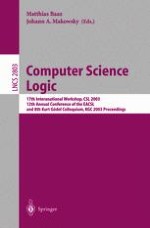2003 | OriginalPaper | Buchkapitel
Simple Stochastic Parity Games
verfasst von : Krishnendu Chatterjee, Marcin Jurdziński, Thomas A. Henzinger
Erschienen in: Computer Science Logic
Verlag: Springer Berlin Heidelberg
Enthalten in: Professional Book Archive
Aktivieren Sie unsere intelligente Suche, um passende Fachinhalte oder Patente zu finden.
Wählen Sie Textabschnitte aus um mit Künstlicher Intelligenz passenden Patente zu finden. powered by
Markieren Sie Textabschnitte, um KI-gestützt weitere passende Inhalte zu finden. powered by
Many verification, planning, and control problems can be modeled as games played on state-transition graphs by one or two players whose conflicting goals are to form a path in the graph. The focus here is on simple stochastic parity games, that is, two-player games with turn-based probabilistic transitions and ω-regular objectives formalized as parity (Rabin chain) winning conditions. An efficient translation from simple stochastic parity games to nonstochastic parity games is given. As many algorithms are known for solving the latter, the translation yields efficient algorithms for computing the states of a simple stochastic parity game from which a player can win with probability 1.An important special case of simple stochastic parity games are the Markov decision processes with Büchi objectives. For this special case a first provably subquadratic algorithm is given for computing the states from which the single player has a strategy to achieve a Büchi objective with probability 1. For game graphs with m edges the algorithm works in time $O(m \sqrt{m})$. Interestingly, a similar technique sheds light on the question of the computational complexity of solving simple Büchi games and yields the first provably subquadratic algorithm, with a running time of O(n2/ logn) for game graphs with n vertices and O(n) edges.
